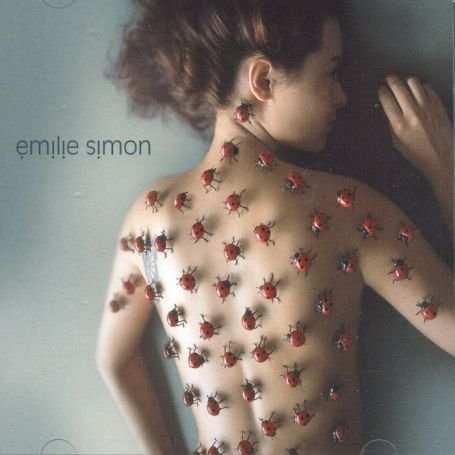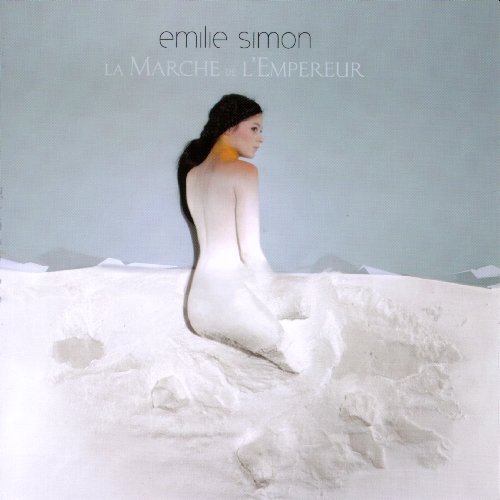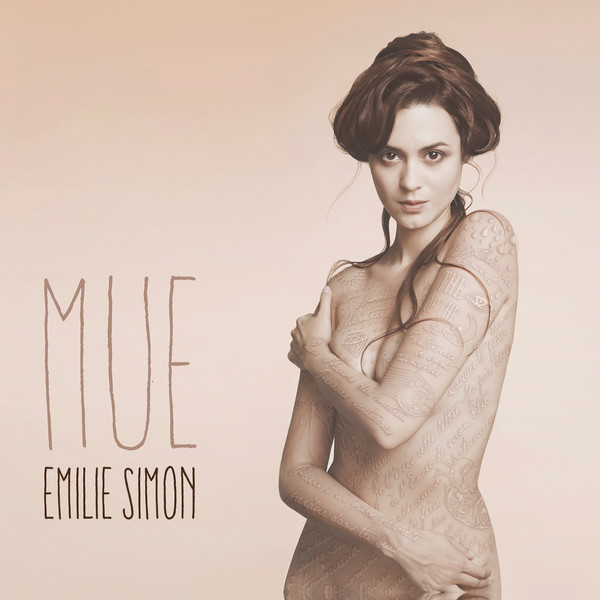Émilie Simon began her career with a self-titled release in 2003. I happened upon it by chance when I was looking for a few new CDs to buy on Amazon France, as I had been a French music junkie since 1997 or so. I had no idea what she was going to sound like, but the album cover, which shows Émilie’s naked back with lady bugs all over it, immediately intrigued me. I’ve always considered ladybugs good luck and it was such a beautiful album cover that I quickly added it to my cart. (The other CDs I bought that day were also debut albums; the artists were Carla Bruni and Melissa Mars, who I also fell in love with and continue to be a fan of.) As soon as the package arrived in the mail, I immediately opened Émilie’s album and put it in my CD player. And I was in love with her music by the time the first song, “Lise,” had ended. The music was rather mellow electronic pop with lots of hushed sounds and little loops, much attention paid to detail. And her voice was extremely beautiful, her vocals almost whispered. I didn’t write a best of list at the end of 2003, but if I had Émilie’s album would definitely have been number one. To date, it remains one of the very best debut albums I’ve ever heard, as well as one of the absolute best electro-pop albums.
Émilie’s sophomore album came in the form of a film score for La Marche de l’Empereur, but you probably know the film by its English title: The March of the Penguins. Unfortunately, the film’s producers didn’t think North American viewers would connect with her electronic score so they had someone else — Alex Wurman — do a more traditional film score for the North American release of the movie. I can’t tell you how much that irked me!
Her next album was 2006’s Végétal, which incorporated sounds made by plants. To that end, many of the playful lyrics pertained to plants as well. The album was a major success, receiving beaucoup positive reviews and performing well commercially. Later that year, a compilation of her first three albums called The Flower Book was released in the U.S. to critical acclaim. In 2007 she released her first live album L’Olympia. It seemed there was no stopping her. And then she released The Big Machine in 2009 and things changed. Many of her fans and critics disliked the album for a few reasons. First, on her previous albums she’d sang rather softly, almost at a whisper, but here she was singing with a very loud voice; it almost made her sound like a totally different artist. Furthermore, the music wasn’t mellow electronica. It still had some electronic elements, but there were more live instruments than on her previous albums, again almost making it sound like a different artist. Finally, the album was entirely in English, which made many of her loyal French fans feel betrayed. Myself, well, I was initially shocked by how different it was, but I wasn’t about to say “nice knowing you” and bid her farewell, unlike the popular blog Filles Sourrires, which is dedicated to women who sing pretty French music. It took a half dozen spins, but eventually the album won me over.
Next came the 2011 album Franky Knight, the title a reference to her late fiancé and music partner, François Chevallier, whom she’d collaborated with on The Big Machine. (Chevallier died from complications with the H1N1 flu while on vacation in Athens, Greece. He was 29 and his death came a week before the release of The Big Machine.) While the sound of Franky Knight was almost as big as that on The Big Machine, Emilie won back many fans as six of the album’s 10 tracks were in French. This brings us to her new 2014 album Mue, which is the French word for molt, which probably refers to the shedding of old feathers or skin or shell to make way for a new growth. In other words, she could mean it as a metaphor for being reborn. But when the word is used as a noun it generally refers to the loss of feathers or skin as part of the natural life cycle, as part of ageing. So, it could just as easily be about getting old as it could be about being reborn. Being one to play with words, it’s possible that she selected the title because it could be open to interpretation like this. On the album’s cover, she’s seen naked but with tattoos all over her body. (No, they aren’t real tattoos.) Again, something that could be interpreted different ways.
Sonically, Mue is like a happy medium between the Émilie Simon of her first three albums and the Émilie Simon of her last two albums. While it consists mostly of live instruments, it’s much quieter than her last two albums and features layers and layers of intricate sound like her early work. Nowhere is this more evident than on the lush opening track, “Paris j’ai pris perpète,” which starts off sounding like a music box. I could be mistaken, but I believe the translation of the title is “Paris I have taken you for life.” Although Google translate indicates that it means “Paris I have taken boonies.” Just don’t ask me what boonies are. Looking up the definition on Google, it states that it’s short for boondocks, which hardly fits here. So, I’m pretty sure that I am right and Google translate is wrong. (Although I’m far from fluent, I have studied French on and off for over a decade.) In any case, the track features lots of organic sounds — gorgeous, sweeping strings, for one thing — along with little electronic details. In my opinion, it’s her most beautiful song in years. I quite liked the Franky Knight album but this tune is better than anything on that album.
Up next is the genre-bending “Menteur” (translation: “Liar”), which is like a blend of Caribbean sounds, jazzy percussion and, to some degree, disco grooves (particularly during the upbeat chorus). And yet it ultimately sounds nothing like any of those things. Rather than sounding like a song that’s borrowing from various genres, it sounds like a song that’s a new genre unto itself. Suffice to say it’s super imaginative and a must-hear. The following song, “Encre,” (translation: “Ink”) starts off very much in the jazz vein in terms of its piano and percussion, but once it hits the chorus for the first time it kicks things up a notch in every way, adding robust strings, punchier beats, etc. Meanwhile, Émilie really opens up her voice and hits some impressive high notes.
Another noteworthy track is “Les amoureux de minuit,” (translation: “the lovers of midnight”), a precious piano ballad that finds Émilie adding emotional lustre to the song’s gorgeous piano harmonies. I’m also quite fond of “Les étoiles de Paris” (translation: “the stars of Paris”), a song full of marshmellowy softness which happens to be another ballad and one that makes me homesick for Paris, being that I’ve been there 4 times and have never felt so at home in the world. This one is an instant classic and that’s partially because it has an air of classic French ballads to it. I can easily imagine the late Edith Piaf singing it, as well as the living legend Patricia Kaas.
All but two tracks on Mue are in French. One of the English language tracks is a cover of Chris Isaak’s “Wicked Games,” which she sings in a very hushed manner, much like her cover of Iggy Pop’s “I Wanna Be Your Dog” on her first album. It’s quite nice, but I’m glad it’s designated as a bonus track and at the end of the album because it does seem a bit out of place here. In terms of the music and her vocals, I suppose it fits fairly well, but it just feels unnecessary, perhaps because so many other artists have covered it during recent years. Curiously though, her version is closer to Washed Out’s recent take on it than the original Chris Isaak song. That said, I do think hers is a great cover. I just think she would have been better off releasing it as a digital single, or even as a B-side, in a few months, not tacking it onto the end of Mue as she’s done.
The other English language track comes earlier in the album. It’s called “The Eye of the Moon” and it’s a beautiful ballad of the dreamy variety. It begins with Émilie simply singing along to quiet acoustic guitar then adds gentle percussion during the second verse. Beyond that, a swirly electric guitar solo plays before another verse. “He lead me through fields, of mountains and streams, to an ocean that lies between physics and dreams,” she sings, her vocals ethereal. After this verse the percussion grows more persistent and the electric guitar returns, this time a bit louder, and the song grows progressively more intense until it’s over.
Ultimately, Mue splits the difference between Émilie’s early career and her more recent work so brilliantly that it’s sure to please anyone who has ever been a fan of any of her previous music. From its most subtle to its more lively songs, it’s so wildly imaginative that it would delight even as an instrumental album.






Leave a Reply